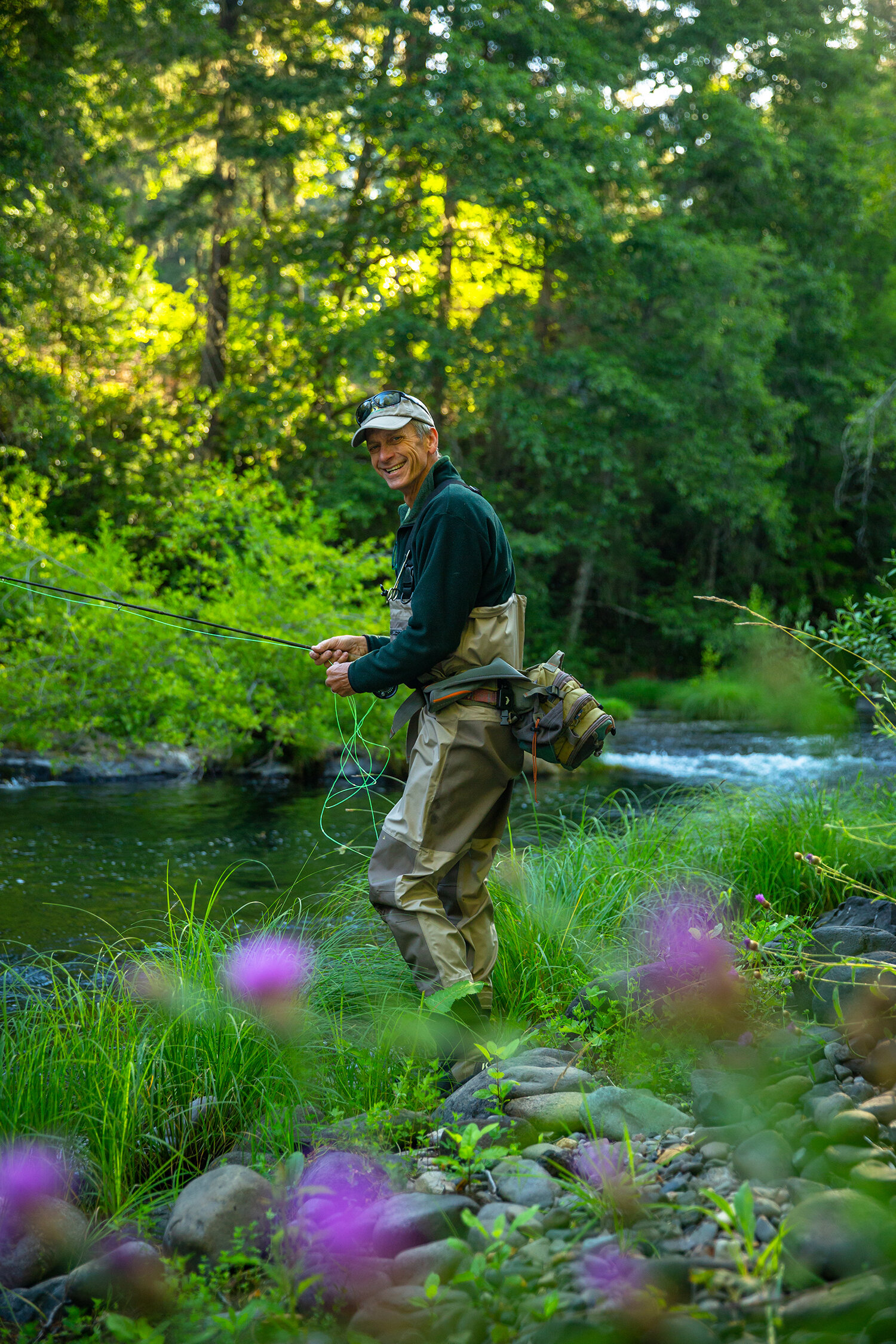Lure of the Umpqua

The Umpqua Valley offers more angling opportunities than you can shake a fishing rod at.
Story by Geoff Shipley Photos by Jonathan Cummings
If you agree with Scottish novelist and historian John Buchan that fishing offers a “perpetual series of occasions for hope,” then you’ll be happy to know (if you don’t already) that Douglas County overflows with pure angling optimism.
With hundreds of miles and millions of gallons of fishable water contained in a host of rivers, streams, lakes, ponds, bays and beaches strung from the forested Cascade Range to the salty waters of the Pacific Ocean, few places boast more beauty, access and opportunity for anglers than this little slice of western Oregon.
The Umpqua River traverses a 100-mile course from mountain range to seashore and serves as the central repository for an extensive basin of some 4,600 square miles—an area larger than Rhode Island and Delaware combined. From the high point of 9,184-foot Mount Thielsen to sea level at Winchester Bay, anglers can explore environments that range from snow-covered peaks and temperate rain forests to rolling oak savannahs and open farmland to shifting tidewater and the relentless waves of the Pacific.
The unique variety of fishing opportunities that follows from such a diverse landscape is something local anglers treasure.
“There’s always something you can fish for, no matter your experience level,” says Barb Murray, a lifelong local angler.
“I lived in Phoenix, Ariz., and was a dedicated bass fisherman,” says Josh Voynick, a retired firefighter who moved to Glide to be near the North Umpqua’s famed fishing. “I read an article in Bassmaster magazine about the smallmouth bass fishing on the main Umpqua and came to check it out.”
Other available warm-water species include largemouth bass, yellow perch, shad, striped bass, catfish, sunfish, bluegill and crappie.
“There’s just something about the crappie,” shares Mary Gallagher, another lifelong local angler. “Especially a ‘slabber.’ A 15-inch crappie is an impressive sight.”
“We spent a lot of time at Diamond Lake with my dad. We loved that time with him.”
— Barb Murray
The array of cold-water species available to those who fish the Umpqua Valley is equally impressive and includes rainbow, cutthroat, bull, brown
and brook trout; kokanee, coho salmon andChinook salmon.
No fish, though, is more synonymous with the resilience and mystique of the Umpqua Valley than the area’s native steelhead, largely owing to the northern fork of the Umpqua River and its famed breeding and rearing grounds for this ocean-going cousin of the trout.
“The North Umpqua is world famous and is one of the best steelhead rivers on the continent,” says Mike McCoy, who’s been chasing fish in the Umpqua Valley for 50 years. “It’s a classic, blue-ribbon stream with 30 miles of fly-fishing-only water.”
Many anglers first introduced to steelhead fishing, even those with plenty of experience in other angling pursuits, discover a challenging quarry that rewards the patient and the dedicated. That’s something Kirk Blaine, a former fly-fishing guide in Colorado, quickly discovered.
“I learned how difficult steelhead are to catch,” he says. “That first trip was a wonderful and humbling experience that sparked a passion I’ll keep pursuing for life.”
Apart from the moving waters of the area’s streams and rivers, the Umpqua Valley boasts a dizzying selection of lakes and ponds, many of which offer both warm-water and cold-water species and the benefit of year-round fishing. Popular and productive lakes and impoundments include Ben Irving Reservoir, Cooper Creek Reservoir, Galesville Reservoir, Lemolo Lake and Toketee Reservoir.
However, it’s large, natural Diamond Lake, high in the Cascades, that brings a special sparkle to many local anglers’ eyes.
“That’s a really fun lake with lots of opportunity to fish a variety of ways,” says McCoy.
“Diamond Lake is one of our favorite places to be in the spring,” Blaine adds.
At the opposite end of the valley, trout and bass give way to crabbing, clamming, surf perch, bottom fishing and targeting salmon, halibut, tuna and other finned creatures of the deep.
“I like (surf) perch fishing,” says Gallagher. “I have rods with me most of the time so I can fish anywhere, anytime.”
With the diversity of fish and types of waters found throughout the Umpqua Valley, the local waters also lend themselves to an angler’s preferred tackle as well, whether that be conventional spin- and bait-casting gear or fly-fishing setups. Plenty of anglers use both.
“I still mostly fish conventional gear because that’s what I know,” says Gallagher. “But I’m learning to fly fish.”
Blaine will exchange his floating line and box of flies for standard conventional tackle when pursuing spring Chinook salmon or the occasional smallmouth bass.
“Using a spinning rod and conventional tackle is usually a quick way to get a couple in the boat,” he says of smallmouth fishing.
Local angler Linda Hall got “hooked” on fly fishing during a trip to Idaho with her husband a few years ago. She says there are plenty of places in the Umpqua Valley to exercise what she calls a more “Zen and calm” way to fish. It’s a pursuit she finds rewarding whether the fish are furiously biting or showing a case of lockjaw.
“I’m happy to just practice casting and catch a fish every once in a while,” she says.
She’s also discovered that fly fishing tends to put some strain on gear closets and rod racks.
“I could never understand why my husband had so many fly rods. Now I have four,” Hall says with a laugh.
Regardless of the particular species being pursued, the specific water being fished or the distinct gear being employed, local anglers in the Umpqua Valley share a deep appreciation of and unique intimacy with their home waters. Part of that includes the cherished memories embedded in the places they fish.
Anglers share about that first unforgettable steelhead landed or wet wading the remarkable waters of the North Umpqua in summer or tranquil evenings at their favorite pond or finding that little gem of a hideaway mountain lake. For most, though, fishing is as much about friends, family, mentors and community as it is about the sport and enjoying the outdoors.
“We spent a lot of time at Diamond Lake with my dad,” says Murray. “He had three girls and that didn’t hurt his feelings. Dad would bait our hooks and take the fish off and clean them. We loved that time with him.”
“I could never understand why my husband had so many fly rods. Now I have four.”
— Linda Hall
“The social part of fishing is big for me,” says Gallagher. “So many people along the banks have inspired me. I give people hooks or lures and ask that they pass on the knowledge and share it with others.” she says
That willingness of others to share is echoed by Hall.
“Friends have been so great about educating me about casting, tying, rigging and just sharing a ton of info,” info,” she says.
She also cites the influence of the Umpqua Valley Fly Fishers club and the supportive outings they offer. McCoy, current club president, points to the veterans-oriented Project Healing Waters as another active local angling group.
“There are lots of ways for new residents and anglers to meet and get involved,” he says.
Still others reference—with reverence—world-renowned local angler and conservationist Frank Moore for his contributions toward defending the beauty and
vitality of some of the Umpqua Valley’s most delicate natural systems.
“It’s not just that he’s an amazing fisherman, but he taught me the value of protecting the resource,” says Voynick. “I’m grateful to live here and help keep things healthy and protected.”
Blaine finds similar inspiration through the Steamboaters (steamboaters.org), a not-for-profit group that’s been caring for the North Umpqua, its tributaries and its natural inhabitants for more than 50 years.
“They’ve been very influential in getting me more involved in protecting our amazing natural resources,” he says.
In a place where those remarkable resources play a key role in creating outstandingly diverse and abundant fishing opportunities, that kind of optimism and enthusiasm only makes sense. Because for anglers in the Umpqua Valley, those perpetual occasions for hope are always just around the bend.









